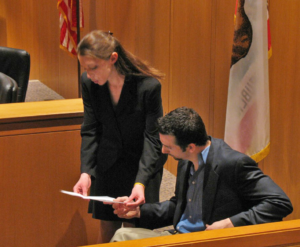 When judges, lawyers, and defendants can’t communicate with each other, the judiciary system quickly grinds to a dead halt. Unfortunately, it happens all too often. That’s because many courts lack the court interpreters that they need to keep the wheels of justice turning. In a country with both non-English speakers and limited English speakers, court interpreters play a critical role.
When judges, lawyers, and defendants can’t communicate with each other, the judiciary system quickly grinds to a dead halt. Unfortunately, it happens all too often. That’s because many courts lack the court interpreters that they need to keep the wheels of justice turning. In a country with both non-English speakers and limited English speakers, court interpreters play a critical role.
Ensuring Accurate Communication
Without effective communication, justice in the court system would be impossible. A non-English speaker can neither answer questions nor give important details if a court interpreter isn’t there to help. Even someone who knows some English usually has difficulty understanding and responding accurately.
A court interpreter can communicate the legal language of the court proceedings to the defendant. They can also interpret the responses of the defendant at the authentic level of simplicity or complexity expressed.
Giving Defendants a Voice
Non-English-speaking defendants may not be able to understand why they are being tried. They can’t communicate with their lawyer. They can’t explain to an only-English speaking judge why the charges against them aren’t valid.
They can’t give important details that might bring the judge to drop their case or reduce the charges. A court interpreter can give them the opportunity to tell their story and respond to questions about it. It’s an important aspect of giving defendants fair treatment.
Avoiding Court Delays
What happens when a defendant needs a court interpreter, and none is available? It’s simple. The court date is pushed back and rescheduled. One reason it happens is that the court can’t schedule a court interpreter until after they determine one is needed. That’s the first delay.
There may be other delays if an interpreter for the specific language needed is not available for each step of the process. Each delay costs both the court and the defendant precious time and money. The defendant may have problems getting back to court again. Every delay is frustrating for the defendant.
Avoiding Dropped Charges
If there are too many delays, the charges may eventually be dismissed. The court is required to provide a speedy trial. When the court can’t provide a court interpreter as needed, the delays can add up until they must drop the charges.
In Maui, an assistant professor named Kaeo needed a court interpreter to defend himself against charges related to a protest. He spoke Hawaiian, which is an official language of the state. Yet, no interpreters were available to help. The charges were dropped. No one will ever know whether Kaeo would have been convicted or not.
Scheduling interpreters is a large part of the solution. However, interpreter scheduling isn’t easy with so many different languages, so many court cases to cover, and so few interpreters to do the work. Fortunately, Interpreter Intelligence offers a platform that can help language services providers manage their interpreters to get the right ones where they’re needed. Find out how it works by contacting Interpreter Intelligence.
With efficient interpreter scheduling, the court runs smoothly and defendants get fair treatment. Everyone wins.

This is my first time pay a quick visit at here and i am genuinely happy to
read all at alone place.
Right now it seems like BlogEngine is the preferred blogging platform out there right now.
(from what I’ve read) Is that what you are using on your blog?
valtrex 2000 mg
azithromycin 450 mg
dexamethasone 0.5 mg
zoloft prescription cost vardenafil hcl 20mg medication robaxin 500
best canadian pharmacy
prednisone 54760
furosemide 30 mg
buy prednisone tablets online
antabuse 125 mg how to get albendazole robaxin 750 generic
buy albendazole without prescription
cialis mastercard
clomid cheap buy prednisolone 5mg australia canadian pharmacy antibiotics gabapentin uk where can i buy motilium in uk
order valtrex canada
synthroid 30 mg online pharmacy store clonidine hcl 0.3 mg tablets
prednisone discount
plaquenil 200 mg price uk
ventolin cost australia
albendazole cream
levitra prices
buy kamagra oral jelly wholesale
gabapentin 200 can you buy doxycycline acyclovir tablets over the counter best online pharmacy india
how much is levitra in australia
lexapro price
buy acyclovir online
[url=http://femaleviagra.best/]50 mg viagra[/url] [url=http://colchicine.lol/]buy colchicine without prescription[/url] [url=http://doxycycline2023.com/]doxycycline 100 mg tablet[/url] [url=http://robaxin.lol/]robaxin tablets 750 mg[/url] [url=http://femaleviagra.cyou/]buy viagra in us online[/url] [url=http://fluconazole.icu/]diflucan buy without prescription[/url] [url=http://isotretinoin.best/]average price of accutane[/url] [url=http://accutanetb.com/]order accutane from india[/url]
metformin cost in mexico
tetracycline staining diflucan price singapore buy keflex online australia purchase motilium suhagra tablet online prazosin for cats best canadian pharmacy to order from
how to buy acyclovir cream
vardenafil best price
generic lexapro for sale
online otc pharmacy gabapentin brand name baclofen pills 10 mg prednisolone drug finasteride prostate colchicine online sale furosemide 12.5 mg without prescription cheap zoloft
accutane 40 mg
albendazole canada
12 mg flomax
tizanidine 4mg for sale
zithromax 500 mg for sale
levaquin 500 mg
buy biaxin cheap
diclofenac topical gel
orlistat 120 mg buy online uk orlistat 84 how to get xenical prescription
where can i buy priligy dapoxetine 60 mg tablets price in india over the counter dapoxetine
buy lexapro cheap no prescription
how to buy diflucan online
metformin hcl
diflucan over counter
where can you buy cialis over the counter
metformin tablets price in india
deltasone 50 mg cost
valtrex price canada
combivent respimat inhaler spray